Eddie Selover
April 17, 2018
As a speech coach and an event planner extraordinaire, Eddie Selover excels in communicating messages and bringing people together, which is pretty remarkable since he’s definitely not a ‘joiner.’ It’s true, a personality assessment verified it! Read on to find out his tips on making anyone a better public speaker and find out how 6 minutes and 40 seconds is the magic number that can both blow your mind and entertain you.
Every once in a while, the universe conspires to send you a signal. On this specific day, I was reading a message from my friend Scott Mann which said something like this: Hi everyone, PechaKucha is coming up soon and it is one of my favorite nights of the year, a group of us are going to the 9pm show, if you’d like to join hit me up! Concurrently, my wife, Marissa, walks up and says, “Hey, have you heard of this PechaKucha thing that so-and-so mentioned to me?”
At this point, is there a remote chance that I would NOT go check it out? Heck no.
What I found at PechaKucha was one part-TED talk, one-part short film and one part-poetry. The essence is simple: each presenter has 20 slides, 20 seconds per slide and it is on a timer. Yep, so every talk is the exact same duration at 6 minutes and 40 seconds. The beauty is certainly in part due to the brevity, and it’s impossible to leave without being truly moved by the event as a whole.
Eddie Selover, the gregarious organizer of PechaKucha Orlando, is a true impresario in every sense of the word. He curates, hosts & delivers this fun event that is truly for the community by the community. When you find out that Eddie’s background is in marketing communications and large-scale-conference you realize how he’s able to pull off this gathering with consistency. I recently caught up with him and had an engaging conversation at the doorstep of the venue which hosts the event …
[Setting: We met in the heart of Orlando in front of the Dr. Phillips Center of the Performing Arts across from City Hall. Originally, my vision was to drag some chairs onto the lawn and have the interview in a large green space. The security guard nicely asked us not to do that, so we returned the chairs and had our conversation under the umbrellas off to the side. We started the interview amidst fire engines and loud vehicles zooming by … ]
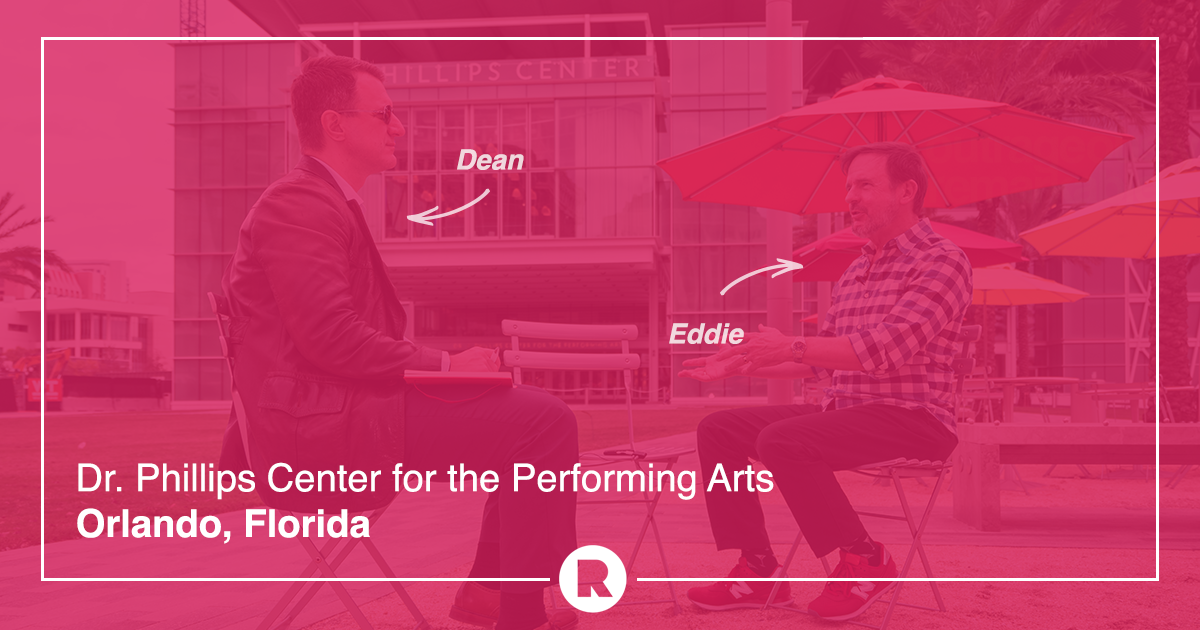
Dean: Eddie, so as a marketing and communications professional, you’re a coach to public speakers, and as a life coach, you help people out. I always hear that the coaches need coaches, too, so who is a coach that has been instrumental to you in the past?
Eddie: I would say that I’ve had a variety of mentors over the years and … I don’t have a formal coach that I use, but I’ve had a variety of mentors and friends who have filled that kind of coaching role. The most important mentor in my entire career was an executive of Prudential Insurance Company named Joe Mahoney, who offered me the opportunity to become his speechwriter and work with him. That was very important for my development because he trusted me even though I was very young and I wasn’t an experienced speechwriter, but he did the important thing that somebody can do when you’re working on their speech with them was that he opened himself up to me, he shared who he was, what he wanted to say, he didn’t put any barriers between us so that I had a really good sense of what he was all about, what he wanted to communicate, and how to help him best do that.
It’s kind of counterintuitive, but the more you open yourself up to other people, the more that they’re able to help you and that’s what happened there. I’ve had, conversely, executives that I’ve worked with who really were not willing to open up, they were self-protective, and the problem with that is that you’re not going to do your best work for them and you’re not going to really be able to help them because they are so self-protected that it’s like, say, people making a mirror face, right? Or you see people who every time their picture is taken, they make their picture face. They’re so controlling about how they want to be seen and they’re not necessarily the best judge of that either. The other factor in it is trust, right? That you trust the other people enough to give them everything and know that they’ll take the best of you and kind of put that forward.
Dean: What’s the best way to get people to open up and be vulnerable in your experience? Is it to show yourself to them? You mentioned trust. Is it to show trust in them and then maybe you get it back?
Eddie: Yeah, I think so. It’s to model it first, to be open with them. And also, to ask, basically. To confront the issue. To say, look, I want you to open up a bit more and go deeper. Sometimes, people just need to hear that. They’re not necessarily going to just do it, but I think if you create the opportunity and you ask, nine times out of ten, you’ll get it. But yeah, you have to open up that space. You also have to be a good listener, right? While you’re talking, most people are waiting for you to stop talking so they can say their bit. They’re thinking what am I going to say next, and oh, I’ve got a good one. They’re not really listening to you. One frustrating thing for me is that when I watch television interviews and the interviewee will say something really fascinating, and the interviewer won’t pick up on it, they’ll just go to their next question. They just missed a huge opportunity there to follow up on that.
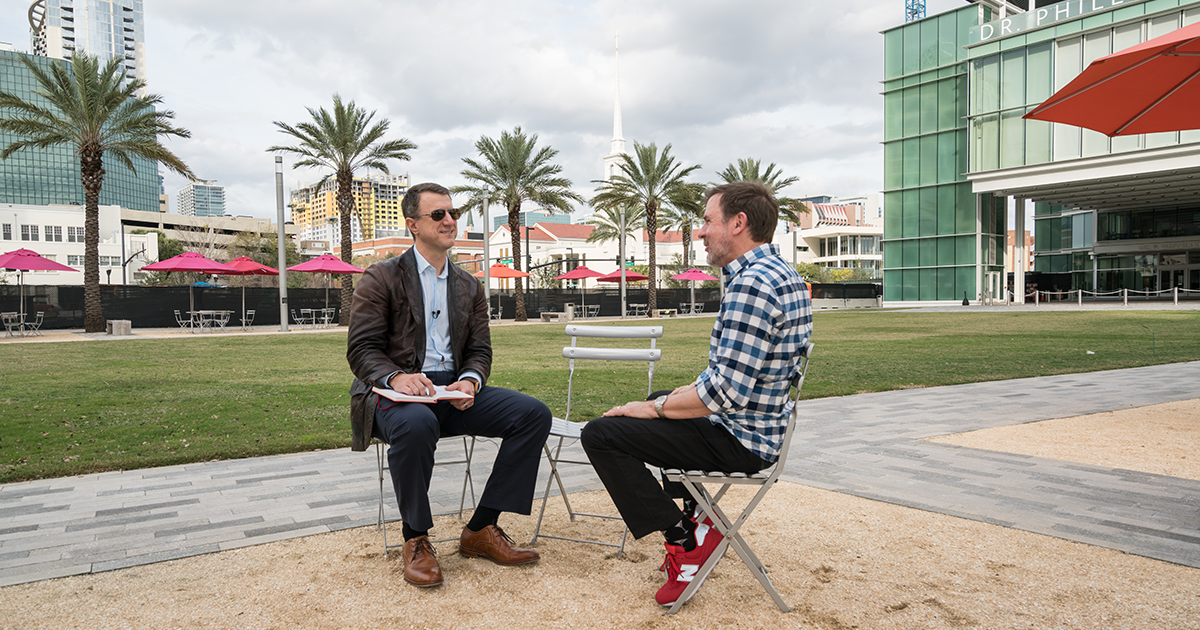
Dean: I’m sure that there’s a lot of people reading this right now that have a fear of public speaking. Are there any actionable tips that you can give that somebody can use right now to help themselves face that fear?
Eddie: Sure. Anybody who is afraid of public speaking or has a problem with public speaking, but wants to do it anyway, should join Toastmasters. Toastmasters, unfortunately, was invented in the 1930s and its name is a little old-fashioned. It has a bit of a stale air to it, like the Better Business Bureau or the Elks Lodge or the Knights of Columbus. It’s not sexy, right? But, it’s brilliantly thought out and it’s designed to get you past your fear of public speaking and it will. The other great thing about it is there are tons of clubs all over. Orlando has more than I can count. Dozens. You can find one near to you, you can find one at a time that’s convenient for you before or after work, on weekends … They’re all structured pretty much the same way so it’s just a matter of finding the club that is conducive to you with people you like, but after a year of Toastmasters, your fear of public speaking will be gone.
Dean: Is the key just repetition of actually doing or is there anything else in their secret sauce that you can share?
Eddie: Well, they have a format to the meeting and in the meeting, at any given meeting, there’s this series of roles and people volunteer for those roles so you might be one of the speakers or you might be someone doing an evaluation, or you might be the person doing what they call table topics, you might be the ‘um counter,’ that’s the person who counts the number of times someone says uh or um. So, these roles allow for as much or as little speaking as you’re comfortable with and you can kind of take your time and work your way up because all of us come into the room afraid. We’re all there for the same reason, we’re afraid of public speaking, so we want to do a little bit of it at a time and know that it’s a safe space before we do more of it.
Dean: So it’s almost like they gamified it.
Eddie: Yes, exactly.
Dean: Okay, that’s cool.
Eddie: It’s brilliantly done and it works.

Dean: I was a part of a similar structure in a networking group for four and a half years and I think the key thing in all that was just you’re there, you’re committed, you’re doing it, and you’re just going to get a little bit better each time. I think the structure is so important.
Eddie: I would say this, I first went to my first Toastmasters meeting as a guest. They invited me to just stand up and introduce myself and maybe say why I came. That was all I had to do. I stood up and I felt my legs shaking and I could hear my voice kind of quivering, right? Now, I speak in front of hundreds of people at a time, often without a script. I have no nerves of any kind, other than the sort of usual kind of ‘want to do good’ nerves, so that’s how far I’ve come.
Dean: That’s awesome. And you are not on Toastmasters payroll, but dang it, if somebody is afraid and they can take the step, I’d say go do it … I mean, I’m assuming that you’re not on the payroll. [Dean laughs]
Eddie: No, no I’m not. I don’t even know if they have a payroll! And by the way, I’m not a club kind of guy. I’m not a joiner. The club part of it was of no interest to me. You know, it’s like anything else, you can stay in it too long. There’s a certain point where you’re over your fear of public speaking and it’s probably time to leave unless you enjoy the club part.
Dean: You know what’s interesting about that? I bet you can create some great relationships there.
Eddie: I did. Actually, it was super helpful for the first PechaKucha night or two because I had a backlog of people who knew how to do public speaking, wanted to do it, so the first PechaKucha Orlando, I think we had eight speakers, six of whom were Toastmasters.
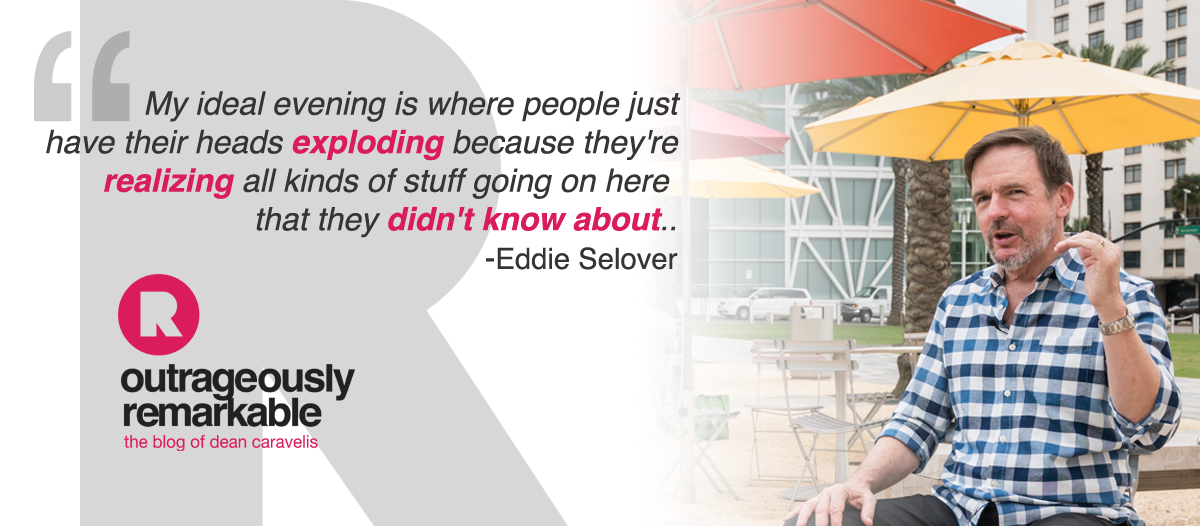
Dean: You said that you’re not a club joiner, but my assertion is that relationship-building is everywhere. Places that you organize or maybe you’re not a joiner, but you did, there are so many unforeseen paths that you can find to take that have beautiful results, you know? I mean, you found your speakers for the first night.
Eddie: Right. I did one of those super complicated personality tests that really goes deep into your personality in my 30s and one of the findings was that for affiliation, my percentile ranking was 5th percentile. Meaning, out of 100 people, there’s four of them who like affiliating with other people less than me. [laughs] So, 95% of people like it better than me. So, I’m not a joiner.
Dean: Okay. Well, I’m going to talk about PechaKucha, but first I wanted to ask, in a parallel universe, doing something different than what you’ve been doing professionally, what would you be doing right now?
Eddie: Well, I think I would really have enjoyed a career as a theater director. I love theater, I love actors, I love acting. I don’t have acting talent myself, but I have a really deep appreciation of it. I’m a film buff. I’ve studied what actors do and it fascinates me and I think that I’m a pretty good director. So, my speech coaching is sort of an offshoot of that impulse.
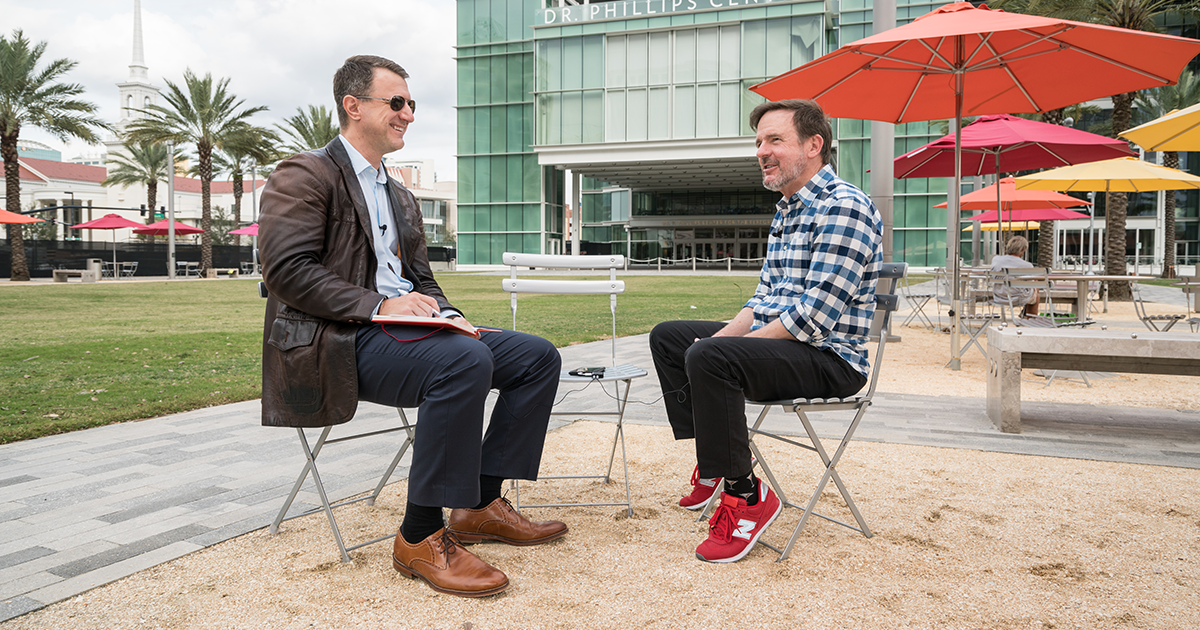
Dean: One of the first times that I heard about PechaKucha … I heard about the Japanese roots, my wife and I had just been to Tokyo and were fascinated with anything that was in any way related …
Eddie: I love Japanese culture.
Dean: How would you describe PechaKucha to somebody who has never heard of it?
Eddie: So, it’s a public speaking format where the speaker has 20 slides and each slide is on the screen for 20 seconds. The slides are advanced automatically on the computer, the speaker has no control over advancing the slides or anything else, so the speaker can’t stop, pause, digress, go back … They have to go through the slides in order, 20 seconds per slide, their talk takes exactly 6 minutes and 40 seconds. So, that’s what it is. PechaKucha Night is a worldwide phenomenon in over 1,000 cities where people come together in a room, it could be a nightclub, it could be a theater, a park, a rooftop, and eight, nine, ten speakers get up one after the other and do PechaKucha talks on any topic.
Dean: What do you think is the magic in it? Is it the minimalism? How it’s like a train that leaves the station and the scenery is already predetermined and you have somebody narrating? That’s one thought that I had, but what do you think is the magic?
Eddie: It’s two things. It’s that in the act of taking your talk and condensing it down to its bare essence because you don’t have time for anything else, it forces the presenter to really get to the heart of the matter and to get there quickly and it reveals the essence of whatever they’re talking about. So that’s one thing. The other is … well, and let me say about that, Mark Dytham, who invented it with his partner Astrid Klein, said once that after people do that kind of cutting and honing and focusing, the only thing left in their presentations is the poetry. And so, it is like poetry. It’s like a haiku. A haiku has all of this compressed meaning so it’s way bigger than the few words. By the way, this won’t make your article, but my daughter wrote the best haiku I’ve ever read, which was for her friend. She really loves her friend, it’s a platonic thing, but he’s very embedded with his family, and she’s got like a friend crush. The first part of her haiku went:
Blue eyes match the sweater
Your sister bought for you
Ryan Fedewitz

Dean: Are you sure I can’t use that? [laughs]
Eddie: Sure, if you want to. But yeah, there’s so much there, right? Like her noticing his blue eyes, her bringing in his sister, her noticing how close his family is … … I loved it, it used his full name.He’s an entity to her. He’s not just Ryan. He’s Ryan Fedowitz. Something about the sister and the last name, it works. And the blue eyes matching the sweater, you kind of get the feelings of her crush and her attention to him.
Dean: So it is sort of the constraints?
Eddie: Yeah, so when you compress and compress like that, it kind of explodes, actually, on the principle of how explosives work, right? Because there’s so much that’s left unsaid, there’s so much out there beyond it that you intuit that things that the speaker hasn’t said.
Dean: If I was going to link a PechaKucha …
Eddie: Can I say one more thing?
Dean: Of course!
Eddie: So you asked where the magic is. The other thing that makes it magic is in the event itself where every single speaker has the exact same format so all the speakers become kind of equal. That’s really cool because I’ve had nights where there have been famous people who are experienced public speakers and very well known in the community, alongside someone who has never spoken publicly in their entire life and never will again. And they’re equal because the format takes over. The format, because the audience is aware that they have this kind of feat of strength that they’re doing, that they’re jumping over 20 hurdles in a row, the audience is really on the edge of their seat kind of wondering if they can do it. They’re aware that the person has 20 seconds, are they going to make it, is the slide going to go too early, too late, did they make it … Ah, okay, on to the next slide. Earlier you and I were talking about mindfulness and being in the present moment, and I think it keeps the audience in the present moment very sharply and directly. When you’re in the present moment, it’s way more exciting than when you’re just in your head rehashing the past or rehearsing the future. You’re right there. Everybody in the room is right there and it’s an extraordinary feeling to be in a room full of 300 people who are all right there.
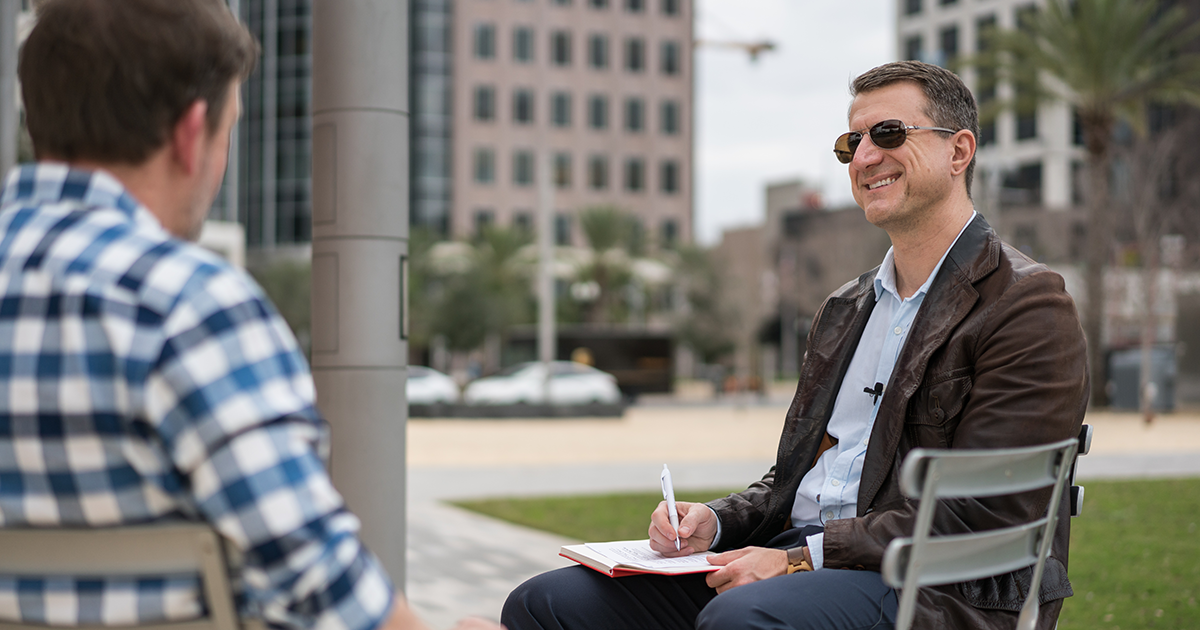
Dean: I’m curious, are there any rules on the slides about what they can and can’t be?
Eddie: Well, there are no rules. That’s the short answer. A bit of a longer answer is that I have rules. I discourage intro and outro slides where it’s the title of it. If you’ve got 20 slides, you don’t want to waste time on the title of your talk and your name. Nor do I particularly like an end slide where you have your name and your contact information and your social media. That’s a waste as well. This is more entertainment. Of course, anything that’s selling something is actively stopped because we’re not attending a seminar on buying condos. We’re not selling things. Words on the slides, too. I pretty much discourage words in general. Very minimal on words.
Dean: Kind of like the anti-PowerPoint.
Eddie: Yes, it’s the antidote to bad PowerPoint.
Dean: Perfect. What’s the most remarkable PechaKucha that you’ve ever seen as far as one presenter or one topic? If you had to pick one.
Eddie: It’s a tough question because there have been so many great ones and there have been so many that just blew me away. The one that I always refer to was by my friend, Mia Mom. Mia is a mermaid at Weeki Wachee mermaid camp and she talked about her dream about becoming a mermaid and how Weeki Wachee enabled her to live that dream and how she went to mermaid camp and learned how to do it, learned the whole thing, and achieved her dream. It was great because it was a personal journey of self-development, but it’s also very old Florida and bizarre and weird. All the best PechaKucha talks open a door into a world that you didn’t know was in Central Florida. Something is happening right here that you have no idea exists. My ideal evening is where people have their heads exploding because they’re realizing all kinds of stuff going on here that they didn’t know about. It makes them feel great about living here.
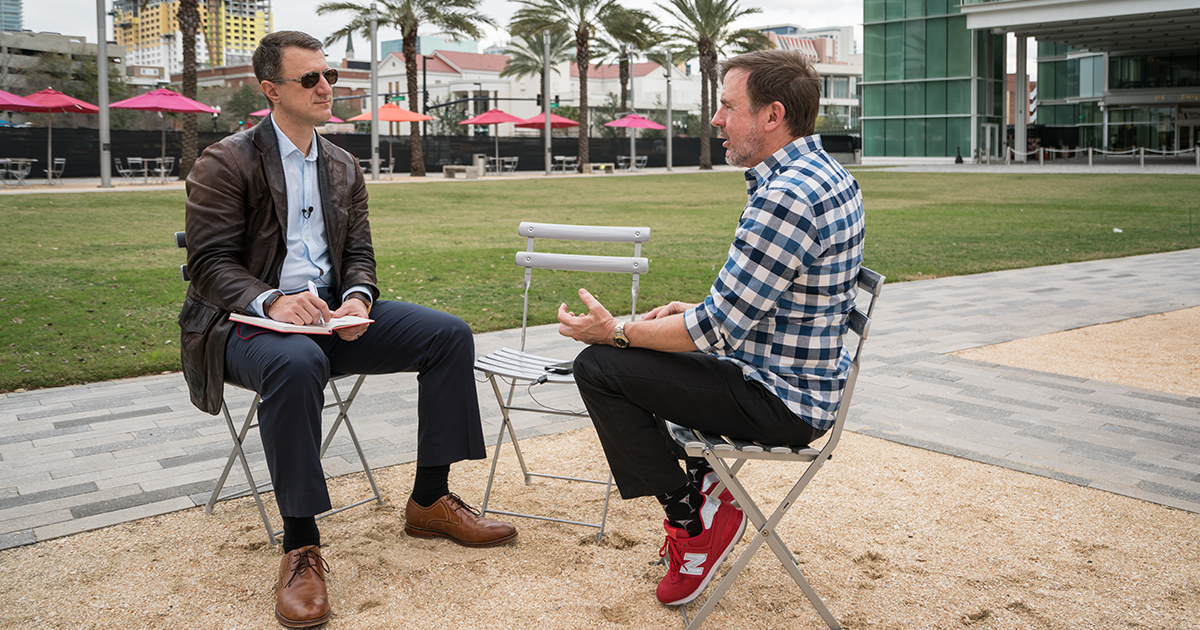
Dean: Do you come up with a theme for the night and then fill that or is there some formula that you use?
Eddie: Every once in a while, I’ll come up with a theme and it doesn’t usually work out that well, to tell you the truth. Sometimes, especially if I think of the theme ahead of time, and the presenters can get very hung up on that and try to match it. Once in a while I’ll create a theme that comes out of what I think they’ll be talking about in the aggregate …
Dean: Like maybe a thread that you can put through many of them.
Eddie: Yeah. The most heavily themed evening I ever did was about movies. I don’t know that I want you to print this, but it didn’t work out so well. [laughs] There were some challenges in it and it didn’t work out like I had hoped, which is very disappointing to me because I’m a big film buff, but it didn’t work. Maybe it was too specific, you know?
Dean: Alright, if you could pick anyone in the world to do a presentation for one of your PechaKucha nights, who would it be and what would it be about?
Eddie: Wow. Anyone in the world?
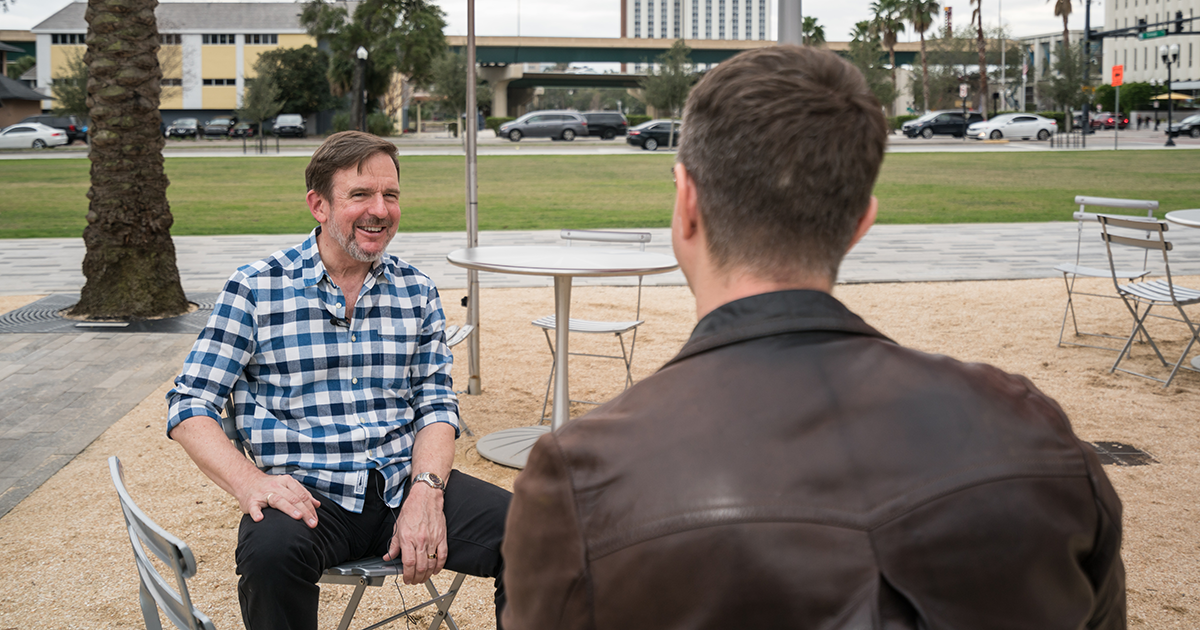
Dean: Yeah, alive right now. This is my variation of the ‘if you could have a beer with anybody’ … I actually thought about this question while I watching the Grammy’s because I saw Bono walk up there and I was like dang it, that has to be my answer if anyone asks me that question again about having a beer. It has to be Bono, so I thought man, who would Eddie pick out of anybody in the world to do a PechaKucha?
Eddie: It would be, gosh … Graham Hancock comes to mind. He’s a writer, he lives in England, I know him personally. He’s a fascinating guy, a brilliant guy. I saw him give a talk once about the evolution of human consciousness and human belief systems and he tied like a whole bunch of stuff together very brilliantly, but the talk lasted maybe an hour or so, so it would be interesting to have Graham fit himself into the format. That would be one. I think it would be wonderful to have Mark and Astrid, the inventors of the format, come here and do it and talk about PechaKucha in general. Even more than Graham, I can’t imagine anything better than that. That would be very cool. And then it becomes just a matter of people I’d like to meet or people I’d like to hear, you know? Parenthetically, I’ve worked in my capacity as an event organizer and a speech coach in the corporate world, I’ve met a lot of famous people and hired them to speak and given them, if not coaching then at least guidelines. The most impressive person of all was Arnold Palmer.
Dean: Why do you say that?
Eddie: So this was maybe seven years ago … We scheduled a mic check for him before he was going to speak, it was maybe the day before. It was in the afternoon. We were in a ballroom at the Portofino Hotel and it was just me and the AV crew and hammering and shit going on, and it was a hot Florida day, sunny outside, but dark in the ballroom. He walked in with a couple of people in his retinue, but they hung back. He came up to me, and when he came in the room, the atmosphere in the room changed. The energetic feeling in the room changed. And I, again, having been in the room with a fair number of famous people in my life, that’s the only time that ever happened. The only time. And I don’t know what that was either, but you could feel it when he walked in. You know, he’s Arnold Palmer. He’s at home in Orlando, he’s doing this relatively small conference, and he just walked up to me, I introduced myself and I told him how it was going to work, where the stage was, where he was going to enter from, what the mic would be like, where he would get mic’d up … Just the technical details of his talk. The entire time that I was talking, he looked me right in the eye, he paid total attention, he asked one or two thoughtful and intelligent questions based on the fact that he was listening to me. There was no sense of like, ‘I’m Arnold Palmer and you’re one of the little people,’ which is a feeling you can get from time to time. To Rudy Guiliani, I was less than dirt, apparently. But yeah, it was just two guys talking and he was there to find out a specific thing, how this was going to work, and he thanked me and when it was time for him to do it, he remembered everything that was said and he just did it. It was easy, frictionless, and he gave a great talk that was tailored to the audience. Friendly, you know, charismatic, open, and looking like maybe 15 years younger than his actual age of like 80. Just a great guy. Very simple, but simplicity like that is not that simple.
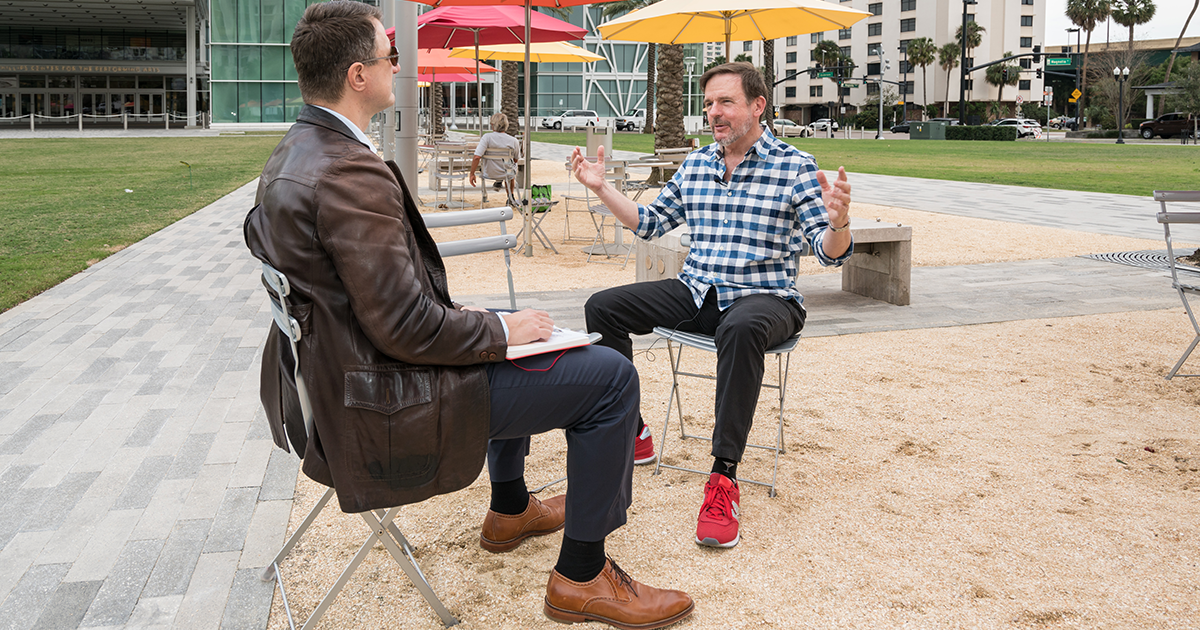
Dean: Well, he exercised a level of humility …
Eddie: Yeah, he didn’t have this big giant ego, he wasn’t like leading with ‘I’m Arnold Palmer,’ whatever that means.
Dean: I mean, he’s got a drink named after him, and to still have that level of humility. So, I have a couple more questions, but since we’re talking about humility, I want you to remove humility for a second and to look at yourself in third-person. As an award-winning speaker, coach, and impresario, what is your secret to being outrageously remarkable?
Eddie: Nice segue. What is my secret to being outrageously remarkable … [laughs] What would Arnie say?
Dean: This is the part where you’re supposed to remove those layers of humility and say objectively.
Eddie: Well, so yesterday, I went to Rollins to talk to a class of senior Honors students who are in a class where they study the speechcraft and then they give a speech at the end of it. One of the things I said to them in that discussion was that one of the secrets of giving a really good speech is to think about the audience, not about yourself. Try to take yourself out of it and think about what is the audience there to learn, who are they, what do they need to know, what do you want them to know, what do you want them to think, to feel, and to do? And then tailor it to them. If there’s a secret, that’s the secret. To try to think about who you’re doing this for, who you’re trying to communicate with, and why you’re doing it. What you want to convey. It’s to take yourself out of it paradoxically.
Dean: That is a common thread between all of those things, whether you’re doing communications and you have to be thinking about the audience. Coaching, same thing … Organizing an event, right? You’re serving. All of those are serving in a way.
Eddie: Well and leadership is serving in a way. Every great leader I’ve ever met is also a great follower. Arnold Palmer, again, he was following my direction, I was saying this was where you’re going to enter the stage … and he wasn’t giving me a lot of shit about that and arguing or contradicting. He was like, okay, that’s where I enter. Great. They know when to be obedient. They know when to be followers. They’re good at following. It’s only the little, really small people who argue … I don’t know if I should say it … Why not. You can decide what to do with it. We had Charles Krauthammer, the Fox News pundit, and he’s disabled, he’s in a wheelchair. They don’t really let you know that on Fox, he just sits at a desk and talks. Krauthammer’s people said that he needed to have a glass of water on the table in front of him and it needed to have ice and a straw, and the ice needed to fill the glass and the straw needed to be held up by the ice, and it needed to be a certain kind of straw. We got that on the table and his assistant was like no, no, it’s all wrong. We had to call up the waitstaff and change up the whole thing and then like two minutes before he went on, it was wrong again, and it was back to the original. So much time and effort went into this glass of water, you know? It was the exact opposite of Arnold Palmer. It was a primadonna majoring in the minors thing. It comes from a lack of trust, basically, in other people. Again, the mark of a real leader like Arnold Palmer, is that he trusts other people. Not that he’s a pushover. Probably if you betrayed his trust or didn’t come through with your part, he would tell you right away, but he’s going to lead with trust.
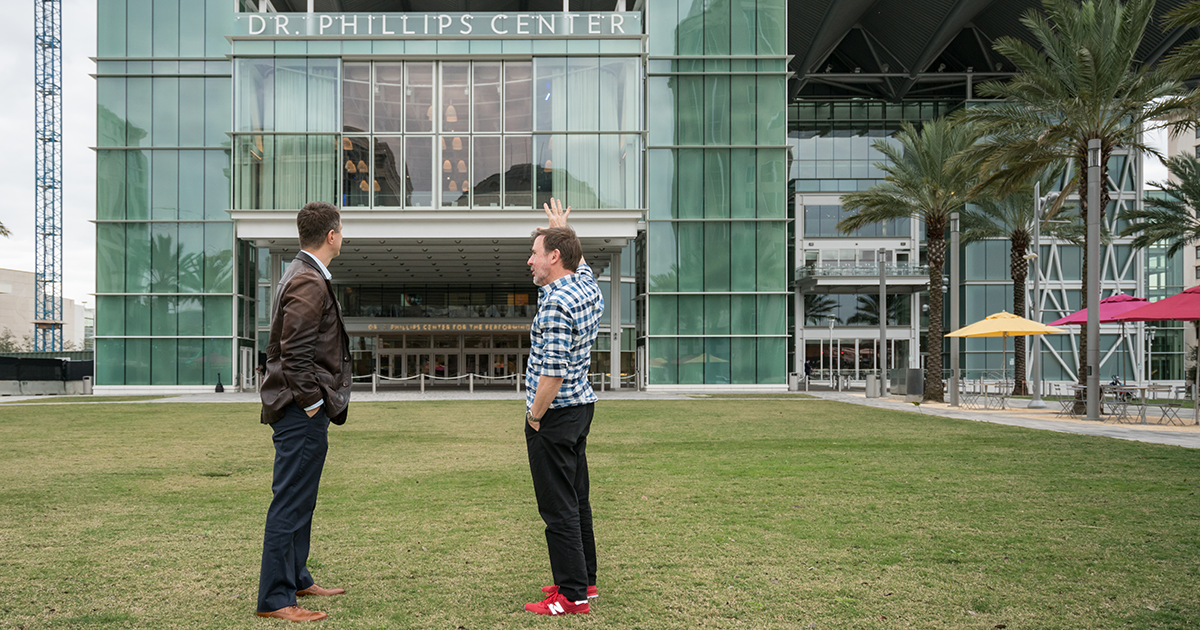
Dean: I wanted to close with, you know, we’re in front of the Performing Arts Center. I thought it was an ideal location since this is where we’re going to be when I’m going to be watching PechaKucha soon, and we talked about the simplicity of format and how it creates this beauty, but I wanted to see, if you were to make your own iteration of PechaKucha, you mentioned that you had your own rules about the slides, what would be your iteration of it? What would you change if you were going to change it just for a night as an experiment? What would you modify?
Eddie: I don’t think I would change anything about it. I think it’s a pretty darn good format. I’ve done 21 events for seven or eight years, I’ve had hundreds of speakers, and I’ve never once thought, ‘Oh, I wish this were different in this way or that way. I wish we could stop or I wish there were more slides, or fewer slides, or a different timing.’ I’ve never wished that. It works. By the way, I’ve been to PechaKucha nights where the organizers do no curation, the speakers showed up, the organizers had never seen the talks until they were live, and it worked. We were in what looked like a bombed out storefront in the middle of being renovated. The carpet had been torn up so the floor was covered in like strips of glue, they did bring in like a port-o-bar and an ice chest, but it was as minimal as you could be without us being on the street, and it worked. So I just added curation and a beautiful building.
Dean: Well Eddie, thank you so much. It’s been a pleasure.
Eddie: Yeah, thank you, Dean. It’s been great.
____________
Check out PechaKucha Orlando (coming up soon! Check it out!) & PechaKucha worldwide to find an event near you! Connect with Eddie on his personal website.
Pics by Josh Johnson on the DPAC lawn! Check out his photography work here.
See who Dean interviews next: Subscribe here to be an insider